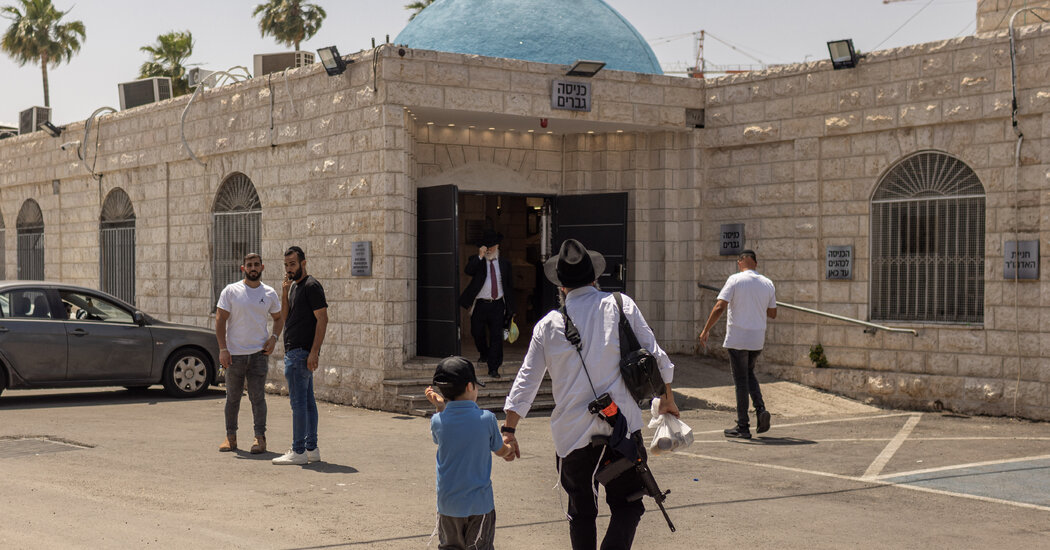Blame for Hamas and little sympathy for Gazans
Some Israelis are struggling to show concern for the people suffering in Gaza, according to interviews conducted in right-wing and liberal strongholds in southern Israel, and with residents from across the country.
Even though Israelis know about the devastation in the enclave, many in the country ask why they should show pity when they say Palestinians there showed none on Oct. 7.
They blame Hamas for starting the war and embedding itself in residential areas of Gaza, which endangers civilians. And the pain of the attacks on Oct. 7 — which was the deadliest day for Jews since the Holocaust — is still raw and increasingly overlaid with anger.
Israel’s mainstream media also rarely focuses on the suffering of Gaza’s civilians and routinely leads broadcasts with the funerals and profiles of soldiers who have died in battle.
Diplomacy: Yoav Gallant, Israel’s minister of defense, visited Washington yesterday for meetings with senior U.S. officials. Prime Minister Benjamin Netanyahu of Israel aired new grievances over the Biden administration’s distribution of munitions for the war in Gaza.
West Bank: An influential Israeli official said the government was engaged in a stealthy effort to cement control of the occupied area, in a taped speech from a private event. And on Saturday, Israeli troops tied a wounded Palestinian to a military vehicle, which was captured on video and quickly went viral, prompting outrage and the promise of an investigation by Israel’s military.
Gunmen killed at least six in a Russian republic
Gunmen killed at least a half-dozen police officers and a priest in two cities in Russia’s southern republic of Dagestan, local officials said. A dozen or more police officers were wounded, state news agencies reported. The attacks — on a synagogue, at least two churches and a police post — appeared to have been coordinated, officials said.
A dozen or more police officers were wounded, Russian state news agencies reported, citing local law enforcement officials. The shootings occurred in the capital, Makhachkala, and Derbent, a city on the border with Azerbaijan. The Russian Investigative Committee, the country’s equivalent to the F.B.I., said it had opened a terrorism investigation.
Region: Dagestan is a predominantly Muslim republic, but it is also home to a Jewish population, and it has experienced a heightened level of violence for at least three decades. Ethnic and religious tensions there have worsened since the Israel-Hamas war broke out.
E.U. and China agree to try to avoid a trade war
China and the E.U. said they would sit down to try to resolve an escalating dispute over proposed tariffs. Billions of dollars in trade are at stake.
The apparent de-escalation comes after the bloc proposed tariffs of up to 38 percent on electric cars from China — and after China threatened to impose tariffs on pork imports from Europe.
MORE TOP NEWS
Heat
Drag is going mainstream in the Philippines, which is both one of the biggest majority-Christian countries and one of the most gay-friendly Asian nations. But there are still few legal protections for gay Filipinos, and same-sex unions are not allowed, so for many artists drag is deeper than sequins and spectacle.
“Drag is not just entertainment,” one performer said. “The mere fact that a man dresses as a woman in public is already a form of defiance.”
CONVERSATION STARTERS
A winning Thai tear-jerker
The movie “How to Make Millions Before Grandma Dies” has become a surprise runaway hit across Southeast Asia. People have been posting tear-streaked videos to social media after watching it.
The film explores the tensions that arise in a family before the impending death of one head of the household, and the gender biases that persist. As an aimless young man takes care of his dying grandmother, initially in hopes of inheriting her house, he grows to better understand the complicated web of characters that make up his Thai-Chinese family.
A 27-year-old financial consultant in Singapore uploaded a TikTok video of himself choking up after seeing the film, with the caption “Running over to hug my Grandma now!!”

